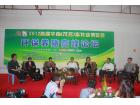巴西和阿根廷的玉米和大豆供应增加
- 点击次数:
- 日期:2013-02-17 17:31
- 编辑:admin
- 来源:加裕
- 评论
巴西和阿根廷的玉米和大豆供应增加
【加裕周评】上周五,美国农业部发布了巴西和阿根廷的产量估计。这两个国家现在开始丰收。相比一年前,玉米和大豆的供应量得到增加。
|
|
万吨
|
|
|
2012-2013
|
2011-2012
|
|
|
巴西玉米
|
7,250
|
7,300
|
|
阿根廷玉米
|
2,700
|
2,100
|
|
玉米总量
|
9,950
|
9,400
|
|
|
|
|
|
巴西大豆
|
8,350
|
6,650
|
|
阿根廷大豆
|
5,300
|
4,010
|
|
大豆总量
|
13,650
|
10,650
|
如果美国农业部的预测准确,大豆的产量将同比增加3,000万吨大豆(12亿蒲式耳),玉米产量将同比增加330万吨(22,500万蒲式耳)。好天气造就好产量。这将有助于保持控制谷物和油籽的价格。同时我们等待美国的产量和天气。
市场
• 52-54%全国每日基础胴体约89 ₵/lb.,去年同期为87 ₵/lb.。现在稍微改善了一些。我们应该发笑,五月的瘦肉期货价格为93.5 ₵,而二月的现货为89 ₵。似乎我们现在是89 ₵,五月就只能有93.5 ₵。五月份的生猪不可能不会明显减少,而价格肯定会上涨。
• 美国农业部报告生长猪的平均价格为40磅的生长猪$80.27/头。这反映出连续高需求与低供应的关系。现货市场的早期断奶猪平均$52.12。
中国客人
上周,我们有来自中国的客人。这是一家中国大型农业企业的高级代表,加裕为他们提供种猪并管理他们的核心种猪场项目。这家中国公司目前有55,000头母猪,其中20,000头正在建设,另外3,000头已经完工并正在经营。
一些观察
• 中国2012年出栏7亿头商品猪,占全球产量的50%。
• 大约有70%为规模化猪场,而30%为家庭养殖。60%的中国肉品为猪肉。
• 这名中国公司的高级经理预期中国未来的进口猪肉将从现在的2-3%增长到10-20%。这将相当于每年7,000-14,000万头商品猪。猪肉进口增加的原因是猪肉需求超出了中国的生产能力。他以日本为例,日本在30年前是自给自足的,但是现在需要进口约50%的猪肉。如果将来中国有10-20%需要进口,正常的来源应该是北美和巴西。
• 中国市场偏好杜洛克公猪与长大母猪的配套体系。似乎对杂交公猪或皮特兰公猪的需求不大。(他们不喜欢吃品味好像纸板的猪肉)这个国家每头母猪的生产能力为14头,急需有更好的种猪。
• 去年(2012年),许多商品猪场每头225磅的商品猪可以获利$30美元。生产成本至少每头$200美元,中国的饲料成本大约比美国高30%。
• 我们的中国客人也进口猪肉。他们由枫叶食品(Maple Leaf Foods)位于布兰登的工厂提供。每周90,000头。他们对枫叶食品工厂的效率、清洁、规模及管理印象深刻。的确工厂的技术就是对枫叶食品效率的证明,但同时也是北美现代化的一方面。能成为这个行业的成员是我们的骄傲。
• 我们的客人也参观了一些加裕的客户猪场,这些场每头母猪年提供断奶仔猪30头以上。这些来自中国的高级代表快速计算了这些成绩在中国所潜在的巨大利润。他们开玩笑地问,如果他们将这些猪场和员工运回中国大陆会是什么结果?这是真正的技术转移。
和以往一样,同来自不同国家的智者相会是真正的学习体验。如同所有不同地方的养猪业者,我们讨论了劳工、饲料成本、健康问题以及市场价格等。所有国家都不相同,但却又相同。我们认为中国在不远的将来将是全球猪肉价格的重要角色。中国将和俄罗斯一样不再排除培林(Paylean)饲养的生猪。和培林一样,一旦在北美大量使用,我们预期异普威(Improvist/ Improvac)将可能成为下一个贸易壁垒。无论正确与否,消费者将决定他们的购买选择。现在很多屠宰厂都有自己的养殖部门,可以根据顾客的特定需求进行快速调节,即无Paylean、肥肉坚实度的DDGS水平等。
致所有和我们一样的农民
克莱斯勒公司制作了一个超级碗的广告。这个广告叫“上帝创造农民”。我们的养猪评论在全球范围传播。每周有43个国家阅读我们的评论。多数美国人都看过这个广告,但是我们觉得这适用于任何地方的所有农民来看一下自己。我们都是农民,这是给所有和我们一样的农民。
原文:
Pork Commentary Feb 11, 2013 – More Corn-Soybean from Brazil-Argentina
时间: [ 2013-02-11 18:09 ]
More Corn-Soybean from Brazil-Argentina
Last Friday the USDA released their estimates for the crops in Brazil-Argentina that have begun harvesting. More Corn – More Soybeans compared to a year ago.
|
|
(Million metric tons)
|
|
|
2012-2013
|
2011-2012
|
|
|
Brazil Corn
|
72.5
|
73.0
|
|
Argentine Corn
|
27.0
|
21.0
|
|
Total Corn
|
99.5
|
94.0
|
|
|
|
|
|
Brazil Soybeans
|
83.5
|
66.5
|
|
Argentine Soybeans
|
53.0
|
40.1
|
|
Total Soybeans
|
136.5
|
106.5
|
If USDA projections prove correct 30 million more metric tonnes of soybeans (1.2 billion bushels) than a year ago and 3.3 million more tonnes of corn (225 million bushels.) year over year. Better weather better crops. It should help keep grain and oilseed prices in check while we wait for the US crop and its weather.
Markets
• 52-54% National Daily Base Carcass is about 89₵/lb., last year same time it was 87₵/lb. A little stronger now. We have to laugh at May lean futures at 93.5₵ while February cash is 89₵, as if May will be only 93.5₵ when we can get 89₵ now. No way there won’t be significantly less hogs in May and prices will be definitely higher.
• USDA reports feeder pigs are averaging $80.27 for a 40lb. pig. A reflection of continued strong demand with lowered supply. Cash early weans average $52.12.
China Visitors
This past week we had visitors from China, the senior representatives of a major agri-business in China of which Genesus has supplied and is managing their nucleus genetic program. The Chinese company has currently 55,000 sows with 20,000 more under construction and another 30,000 finished and being placed.
Some Observations
• China produced about 700 million market hogs in 2012 about 50% of global production.
• Approximately 70% in commercial facilities – 30% backyard, 60% of all Chinese meat is Pork.
• The senior manager of the Chinese company expects that in the future China will go from 2-3% imported pork to 10-20%. That would be 70-140 million equivalent market hogs per year. The reason for greater pork imports would be pork demand outstripping Chinese production capacity. He cited Japan of which 30 years ago was self-sufficient but now imports approximately 50% of Pork. If 10-20% imported to China in the future the logical source North America-Brazil.
• The Chinese market prefers Duroc Boars bred to Yorkshire-Landrace sows. There appears little demand for synthetic or Pietrain type boars. (They don’t want to eat pork that tastes like cardboard) Pig Production per sow in the country is approximately 14 and the need for better genetics is paramount.
• Last year (2012) many commercial producers made about $30 US per head with a 225 lb. hog – Cost of production is at least $200 US per head with China feed costs about 30% higher than the USA.
• Our Chinese visitors also import pork. They were hosted by Maple Leaf Foods, Brandon Plant. 90,000 head per week. They were quite impressed by the efficiency, cleanliness, scale and organization of the Maple Leaf facility. Indeed the technology of the plant was a testament to the efficiency of Maple Leaf but also the modern scope of North America. Made us proud to be part of such an industry.
• Our guests also visited some Genesus customers producing over 30 pigs per sow. The senior China representatives were quickly calculating the huge profit potential of such results in China. They wondered jokingly if they could load the barn and staff and ship it to the Chinese mainland, true technology transfer.
As usual meeting with smart people from different countries is a true learning experience; like all pig farmers everywhere there was a discussion of labour, feed costs, health issues, market price etc. All countries are different but the same. We think China will be the wildcard for Global pork prices in the near future. Sudden importation of pork will be market movers. China like Russia will not except pork from Paylean fed hogs. We expect Improvist (Improvac) like Paylean will likely become another trade inhibitor if it reaches significant usage in North America. Right or wrong the customer dictates what they buy. With many packers now having their own production, customized need for customers can be adjusted rather quickly, i.e. No Paylean, DDGS level for fat firmness etc.
To the Farmer in All of Us
Chrysler made an Ad for the Super Bowl. It’s called “God made a Farmer’. This commentary goes around the world. It’s read in 43 nations weekly. Most in American has seen the Ad but we think it’s appropriate for all farmers – everywhere to look and see for themselves. We are all farmers – This is to the farmer in all of us.
http://www.youtube.com/watch?v=AMpZ0TGjbWE&feature=player_embedded
- 2012-12-25巴西猪肉出口量的增加得益于主要的传统出口市场
- 2012-11-08巴西大豆已播种面积仅占计划种植面积的32%
- 2012-11-01Brasil Foods将在中国建设新的猪肉与家禽加工厂
- 2012-10-15巴西对阿根廷的猪肉出口受阻
- 2012-09-14巴西向日本出口猪肉进入谈判实施阶段
- 2012-09-05巴西开始对日本出口猪肉
- 2012-08-15联合国官员呼吁美国停产玉米乙醇 拯救饲料业
- 2012-07-13巴西为养猪业提供特别贷款稳定价格 约1亿美元
- 2012-06-25温家宝参观阿根廷农庄称愿扩大中阿农畜贸易
- 2011-10-20阿根廷牲畜屠宰量减少导致上百家屠宰场停业
| 查看所有评论 最新评论 | |
|
|
|
| 发表评论 | ||||
|
- 欧盟仍有17国未能完全执行母猪限位栏 250
- 报告显示英国去年抗生素使用量大幅下滑 236
- 拉脱维亚爆发五起非洲猪瘟疫情 222
- 河南畜牧产业化(生猪)集群襄城实验区 216
- 发现莱克多巴胺,俄将禁止美国牛肉和猪 211
- 欧盟批准从美国进口生猪 从2月25日 211
- 美国本月的猪肉以及牛肉出口同此下滑 207
- 加拿大猪肉研讨会认为媒体应当促进消费 206
- 寒冷天气阻碍俄罗斯境内非洲猪瘟疫情的 197
- 荷兰应用DNA技术检测和治疗生猪疾病 195














